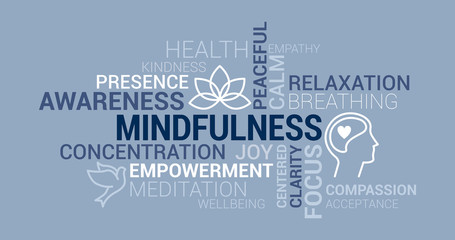Rhonda Frank, April 19, 2021
So what exactly is mindfulness? If you search the web, you might find a variety of explanations as to what mindfulness entails. Some sources cite that it is either about meditating, deep breathing exercises, or being fully aware of how your body feels.
Mindfulness can be all of those things, but it can be so much more too. Mindfulness is an invitation to step out of the daily clutter of life and focus on the here and now. Mindfulness is the basic human ability to be fully present, aware of where we are and what we’re doing, and not overwhelmed by what is going on around us in the moment in an accepting, non-judgemental manner. Mindfulness is something we all naturally possess, but it is more readily available to us when we practice this skill on a daily basis.
Mindfulness and awareness include not only focusing your attention on sights, sounds, smells, tastes and touch that we experience in the interface between ourselves and the environment but to notice bodily sensations occurring within us as well; accepting non-judgmentally all experience even if it is painful. This may seem counterintuitive, but it allows us to release those feelings instead of using strategies for coping that simply help people numb, distract or ignore distressing sensations. Today will focus more on a gentle mindfulness grounding technique.
Mindfulness also involves acceptance, meaning that we pay attention to our thoughts and feelings without judging them—without believing, for instance, that there is a right or wrong way to think or feel in a given moment. When we practice mindfulness, our thoughts tune into what we’re sensing in the present moment rather than focusing on the past or worrying about the future, we become more aware—we are in a state of wise mind. In contradiction, judgment often serves to prevent us from authentic connections with others, genuine self-knowledge, awareness and living our most meaningful lives.
Research shows that mindfulness can help improve your general well-being and improve your quality of life. It can help you to reduce stress and anxiety, manage symptoms of some mental illnesses and substance use problems, and improve your overall physical health. When we look at our own lives more clearly through mindfulness, it can help us to develop a different relationship with our experiences which can give us space to view issues from all perspectives, without letting difficult thoughts or feelings cloud us.
There are many simple ways to practice mindfulness. A few examples include:
- Use your senses. It’s hard to slow down and notice things in a busy world. Try to take the time to experience your environment with all of your senses — touch, smell, sight, sound, and taste. For example, when you go outside what does the air smell like? What can you hear? How does the air feel like on your skin? What do you see?
- Accept yourself. Treat yourself the way you would treat a good friend. Be kind and forgiving to yourself. Embrace the present moment as it is, both the good and the bad, rather than resisting it or focusing on changing it.
- Live in the moment. Try to intentionally bring an open, accepting and discerning attention to everything you do. Find joy in simple pleasures. Like the old saying goes “take time to stop and smell the roses”.
You can also try more structured mindfulness exercises, such as:
- Focus on your breathing. When you have negative thoughts or feel the effects of stress try sitting comfortably—this doesn’t have to mean having your back straight or your feet flat on the floor—just sit how you feel comfortable. If you feel safe, close your eyes. If possible, breath through your nose. Just breath as you normally would. Focus on your breath as it gently moves in and out of your body. If thoughts interrupt your meditation, note the experience and then return your focus to your breathing—it’s okay if your focus shifts, forgive yourself and re-focus your attention on your breathing. Sitting and breathing for even just a minute can help bring calmness to you.
- Body scan meditation. Sit comfortably or lie on your back with your arms relaxed at your sides. Focus your attention slowly and deliberately on each part of your body, in order, from head to toe or toe to head. Be aware of any sensations, emotions or thoughts associated with each part of your body. You can take this a step further by using progressive muscle relaxation—purposefully tensing up a single body part, holding for a few seconds, then relaxing as you shift your focus up or down your body from head to toe or toe to head. Not everything we notice will be joyful. We may notice that we are tired or in pain, for example, but those observations are still useful.
- Walking meditation. Find an environment that works for you. This can be indoors or outdoors, depending on what works for your lifestyle. Note that if you can walk outdoors in nature, it can have added benefits to your health. A place with fewer distractions and quietness is ideal but not mandatory. A slower pace is more effective for walking meditation—slow down and appreciate your surroundings. Pay attention to the environment around you using all your senses. Open your eyes to the surroundings and take in your sights as if you are looking at things for the first time. What new things are you noticing around you? Note the sounds you are creating with your body or any noises around you. When your feet hit the ground with each step, how do your feet feel and what noise does this connection create? Be aware of all of your senses and note how each one makes you feel.
- Eat a meal without distractions. We are distracted daily by so many things going on around us. Try having a meal without distractions such as technology. Pay attention to what you’re eating, how does it feel in your mouth, what does it taste like, how does it make your body feel—what other sensations come up while you are eating?
Aim to practice mindfulness every day—over time, you might find that mindfulness becomes effortless. Think of it as a commitment to reconnecting with and nurturing yourself.


Comments are closed